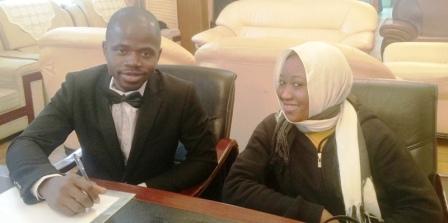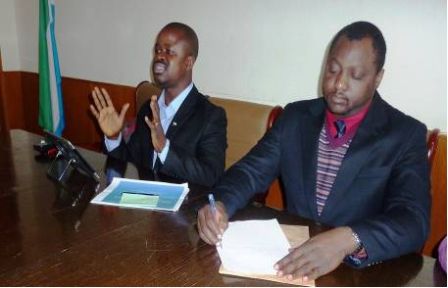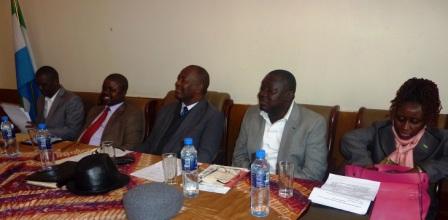Sierra Leone Students Union in China Annual Convention
SIERRA LEONE STUDENTS UNION IN CHINA (SLSUC) Annual Convention, 9-13 February, 2013, Beijing, PRC
Keynote Address: “Educated Sierra Leoneans in Politics and in Society”
By H.E Abubakarr Multi-Kamara, Ambassador
Mr. Chairman, distinguished members of the Executive of the Sierra Leone Students Union in China, the general body of students present here today, ladies and gentlemen.
There can be little doubt that Education and Politics affect each other in quite profound ways. The impact of politics on education is clear enough. How much money in the national budget is allocated to education; how teachers are recruited and how much they are paid; whether more money is spent on state security (police and military) than on human security (schools, health care, shelter etc); what kind of values are transmitted in the school system or whether the Minister of Education is on good speaking terms with the Minister of Finance are all political issues which could profoundly affect education.
On the other hand, political life and the political system in our country are in turn affected by the educational process. The quality and exposure of Sierra Leoneans who find their way to responsible political leadership positions, the kind of political values which activate policy and behavior, the class structure in our society, the system of occupational recognition of service and reward system are all factors deeply influenced by the educational system of a country.
During the colonial period in Sierra Leone, like in many other African countries, education served the purpose of creating not only a reservoir of qualified people which the colonial government could use, but also a good pool of potential qualified nationalist who came to challenge the colonial presence itself. This might have been more pronounced in countries such as Ghana, Zambia, Kenya, Zimbabwe etc compared to the experience in Sierra Leone, where the de-colonization period was relatively less eventful. There was no such thing as holistic progressive common front such as was the case in Ghana. As the late President Stevens described it in his “What life has taught me”, the situation was “…far from being as harmonious and progressive as they might appear. The debate on constitutional provisions for independence was fraught with “…strong conflicting attitude of the protectorate and the colony”. To the extent that this internal disconcertedness would profoundly impact the evolution of our national goals and political values in Sierra Leone after independence should be of continued interest to researchers in our nation building effort in the 21st century.
But we have come a long way, as a country and as a nation, through thick and thin, and we now have a lot in recent years to look back and be justly proud of. As recently as November 2012 we have demonstrated that we are an example of a consolidating democracy and one of the safest and most peaceful societies in the world. We conducted the first multi-tied elections in our history, monitored by over ten thousand national and international observers, making the polls the most transparent in our country’s history. Four elections were conducted on the same day, making the process the most complex electoral exercise in our nation since independence; we paid for most of it ourselves; we organized it ourselves, and we did it peacefully, fairly and transparently. And the process, from registration to announcement of results has been acclaimed as meeting international standards of free and fair elections. As underscored by His Excellency the President, “We must claim these achievements. We must congratulate ourselves; we must applaud the state institutions, from the National Electoral Commission and other democratic institutions to the police, the RSLAF and other security agencies for their immense contribution to this achievement. This is a national history, another addition to the achievement of the people of this country”.
Against the backdrop of this growing resolve to continue to consolidate on our democratic gains, and as we harness our collective wisdom and strength to support our ongoing Agenda for Prosperity, the question all progressive and patriotic Sierra Leoneans must now ask is what national goals ought to be an important part of our educational system, regardless of which political party is in power? Where should indoctrination come into the syllabus and in what form?
As Ambassador and a proud Sierra Leonean with a moral, social and political commitment to the national endeavour, my position has been that indoctrination in education is desirable in the primary schools; it is defensible in the secondary schools; but is quite demeaning beyond secondary schools. It is desirable at the primary level because children need some guidance as they evolve a capacity for making choices; and the political world can seem mysterious and even frightening without some explanation. Therefore, transmission of political values to children at the primary level provided the values are broad and rudimentary and basic to the task of living in a society, is in my opinion an educational imperative.
At the secondary level, the transmission of values should become more sophisticated, with a high degree of critical flexibility and individual choice permitted within the system. The higher levels of secondary education may begin to dispense with political education as a process of socialization, and embark on political analysis as a more detached and independent approach to the understanding of politics. By the time they complete the sixth form or SS4, the students have to be treated as intellectual adults from the point of view of political values. In other words, the emphasis from then on ought to be in perfecting the critical faculties and sharpening individual reasoning, rather than transmitting social values. The period of indoctrination should be coming to a close by the end of secondary education, and preferably two years before the end of secondary education.
What we are saying in essence is that at the level of the primary and secondary schools, part of the aim of education is to inculcate into children the values and norms of the society to which they belong. Such inculcation must be in the form of moral and cultural indoctrination. And then the child, duly indoctrinated may enter Fourah bay College, Njala University or any other tertiary institution at home or abroad, as an undergraduate. But what then happens at that level?
Instead of a child being taught what to value, the young person is now taught to be critical about almost every value. Instead of cultural indoctrination, there is now a partial cultural exchange and self-criticism.
Having arrived at this point in my argument, what then do we say are the appropriate political values that could be introduced in our education system by way of some degree of indoctrination?
In my opinion there are only three politically significant values which can be inculcated in the educational system and retain their relevance regardless of the political party in power. I call these values ‘the three T’s of training in nationhood. The T’s I have in mind are “Tolerance”, “Toil” and “Teamwork”. These T’s are to supplement the traditional three R’s of basic education – Reading, Writing and Arithmetic.
By ‘tolerance’ I do not mean the promotion of a sense of ‘brotherhood’. As if you hear people sometimes say we should all consider ourselves in Sierra Leone as brothers and sisters. This is not what I mean. The idea of human brotherhood is a religious idea, and people respond to it more positively when they are listening to a sermon in a church or a kutuba in the mosque, than in their daily lives. It is not just realistic enough to expect people who are otherwise rivals and strongly in competition, and have no connection of any kind with each other in blood or cultural affinity, to regard each other as brothers nevertheless. For the majority of people it is fair to ask them to tolerate those who are different from them. It is not as realistic to expect them to treat total strangers and total aliens meaningfully as brothers. Even a literal neighbor may be quite demanding – if he or she is perceived as a ‘congosa box’, if he plays too loud a music at night or if his children are boisterous and tend to scream and habitually misbehave, or if he/she has a habit of coming to your home to borrow fish never to be returned.
The critical issue for society therefore is not how much brotherhood there is but how much tolerance. There is no special credit in being favourably disposed towards your brother. The real test comes when, in spite of being unable to regard a stranger as your brother, you still succeed in tolerating his unusual and different ways. The education system should allow for this critical variable in human relations. Our society, need, above all, the capacity to tolerate people of different tribal or cultural background, or different regions and identities or different political views. In other words, I would also submit that our society in Sierra Leone today need to be governed by the liberal rules of the game– the rules which simply say ‘live and let live’. The liberal rules of the game permit competing views and competing interpretations of reality to survive together in harmony and peaceful co-existence.
Yet tolerance is, in fact, the most difficult of these three values to be inculcated to children. Children are notoriously intolerant at times, and can be painfully and brutally cruel. What kind of approach should be adopted to foster and build up their capacity to tolerate others is perhaps one of the most important and yet intractable problems in the whole field of child education.
But at the level of intellectual tolerance there is a good deal to be said for a system of education which puts a special premium on debating as an activity. The idea of getting schoolchildren to debate among themselves on a variety of fundamental issues has great potential as a teaching device to promote tolerance of different viewpoints. The training here springs from exposure to radically polarized viewpoints. Every school in Sierra Leone must do its best to have a vigorous literary and debating society. The debates should take place several times a term, instead of once or twice a year. By all means, these debates must be combined with the idea of inviting controversial speakers to address current affairs societies, and answer student challenges and expostulations.
The situation in many African countries, Sierra Leone being no exception is one of fluid values, not entrenched values, like in developed Western societies, with policy issues that have stabilized in certain spheres, combined with entrenched institutions and mature political and economic systems. Our society is still groping for social directions and there is mutability of political preferences. In this kind of situation, youth demonstrations are not the appropriate mode of youthful assertion. Instead of demonstrating in the streets, there should be continued promotion of debating as a device to help these young people find their own intellectual resting place. Debating then becomes a useful technique in a situation of fluid values because it helps to sharpen the faculties of deciding between different values, and gradually developing a sophisticated evaluation of different alternatives.
The imperative of “Toil”, like the other two T’s, is subject to cultural variations. Attitude to work is conditioned those cultural factors. Some writers have claimed that in traditional Africa everyone was a worker- ‘a worker’ not just as distinct from ‘loiterer’ or ‘idler’. They see work in traditional Africa as a factor balancing African hospitality. But this tradition of hospitality and support for one’s kinsmen could all easily result in parasitism. The role of the modern school in dealing with such scale of values might vary according to the dominant orientation of the government in power. Our current government, under the leadership of President Ernest Koroma, is inclined to foster and encourage the ethic of self-improvement, since the government is committed to the goal of creating an indigenous entrepreneurial culture and private enterprise. Furthermore, educators could investigate ways of transmitting the ethic of work in a manner which attempts to reconcile working for society with working for one’s self-improvement. The very process of acquiring an education poses the dilemma between education for effective citizenship and education for personal ambition. You will agree that, for many the harder it is to acquire an education, the more it will be regarded as a passport to a future life of leisure. Many African children walk long distances every day, and take heavy part-time work, in the endeavour to acquire an education. Because they have acquired their education the hard way, they tend to feel at the end of it that they have ‘arrived and deserve to rest. Thus the educated become, alas an elite of leisure.
The third “T” of training in nationhood is “Teamwork”, and it is important that there should be opportunities for teamwork at all levels of education. These should range from encouraging basket ball and soccer to encouragement of student political societies and social organizations – as opposed to the variants of organized cultism! Extra-curricular activities are also experiences of being socially engaged and intellectually committed. Behind it all is the further experience of team work and collaboration, even in situations where one team has to compete and even quarrel with one another. The liberal rules of the game are once again at play – ‘Live and lets live’
The aim of this paper to promote an active conversation on the challenges that continue to elude our nation building effort, the inculcation of the rules of national integration being one of the most potent. Africa is confronted with ethnic pluralism and cultural diversity, Sierra Leone being no exception. The interaction between different tribes is bound to generate considerable stress and tension. Our general quest is for a system which would permit these groups not only to tolerate each other – the first pre-condition – but also to work with each other in pursuit of shared national goals of development and prosperity.
Perhaps more work needs to be done regarding how best to transmit in the Sierra Leone context, the three imperatives of tolerance, toil and team work. Debating societies and games need to be studied more closely in their sociological and psychological implications. They have too often been taken for granted as mere diversions for young people – ‘after all, all children need to play’. Some school games may be better suited for training in tolerance and team work than others. If so, which are which? Educational research could pay renewed attention to the study of sports and games, and their comparative efficacy as media of socialization and promotion of national values. If certain games, as yet untried in schools, are better for citizenship – training than those which are already popular, there is a compelling case for promoting experimentation with new games.
Mr. Chairman, ladies and gentlemen, you all have a role in promoting and directing this conversation. The time is nigh for our great country and its great cultural diversity to close ranks and see the meaning of being Sierra Leoneanean first, before the beautiful tribes that we also are, bound by a common destiny and determination to transform our enviable god-given resource advantage into a sustainable development advantage for all.
I thank you for your attention and wish you the very best in your deliberations.
Stay with Sierra Express Media, for your trusted place in news!
© 2013, https:. All rights reserved.





